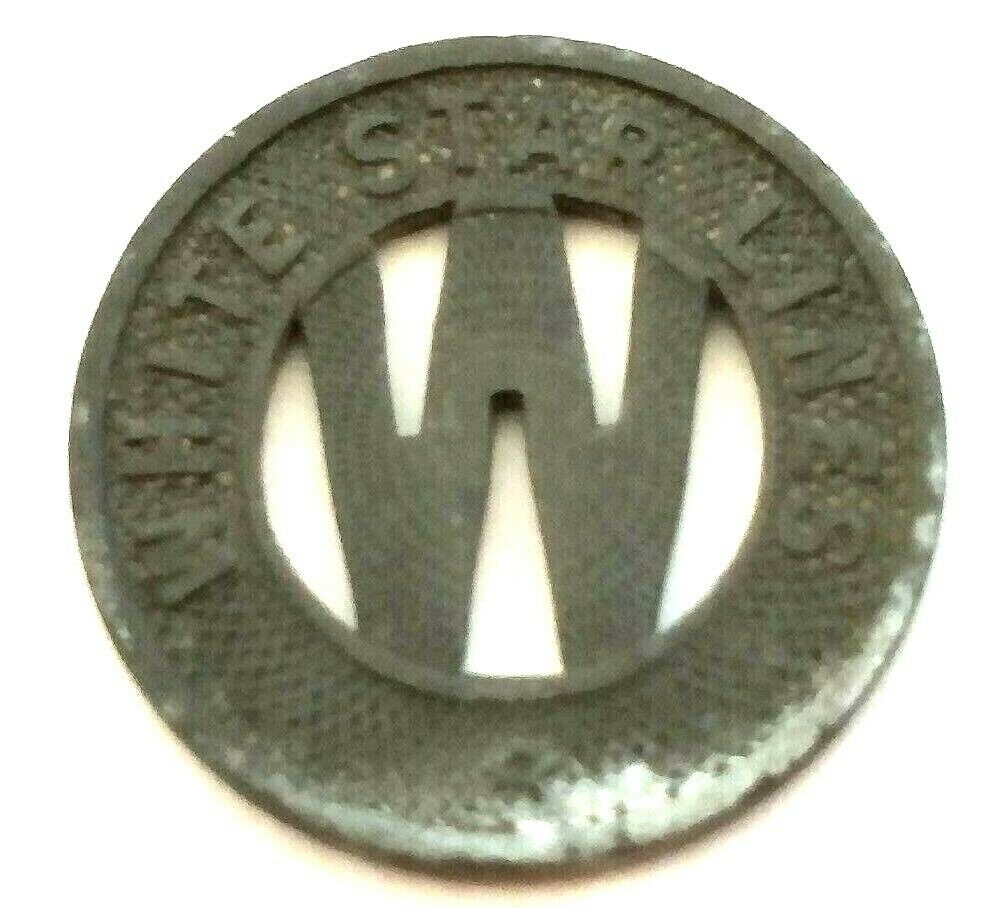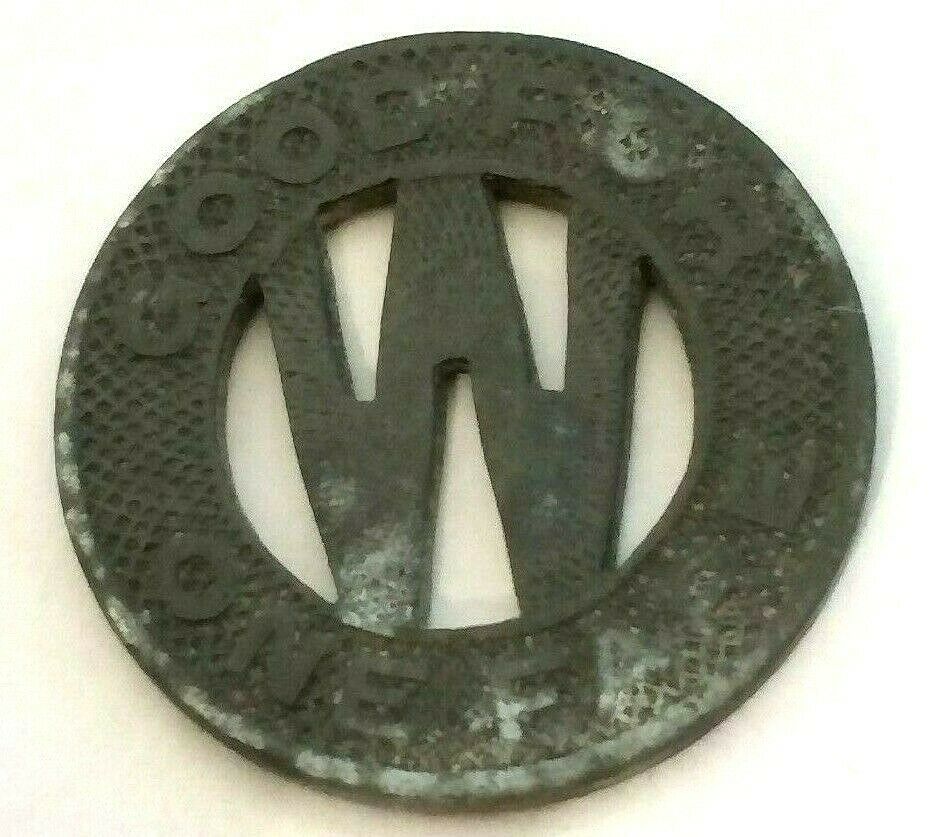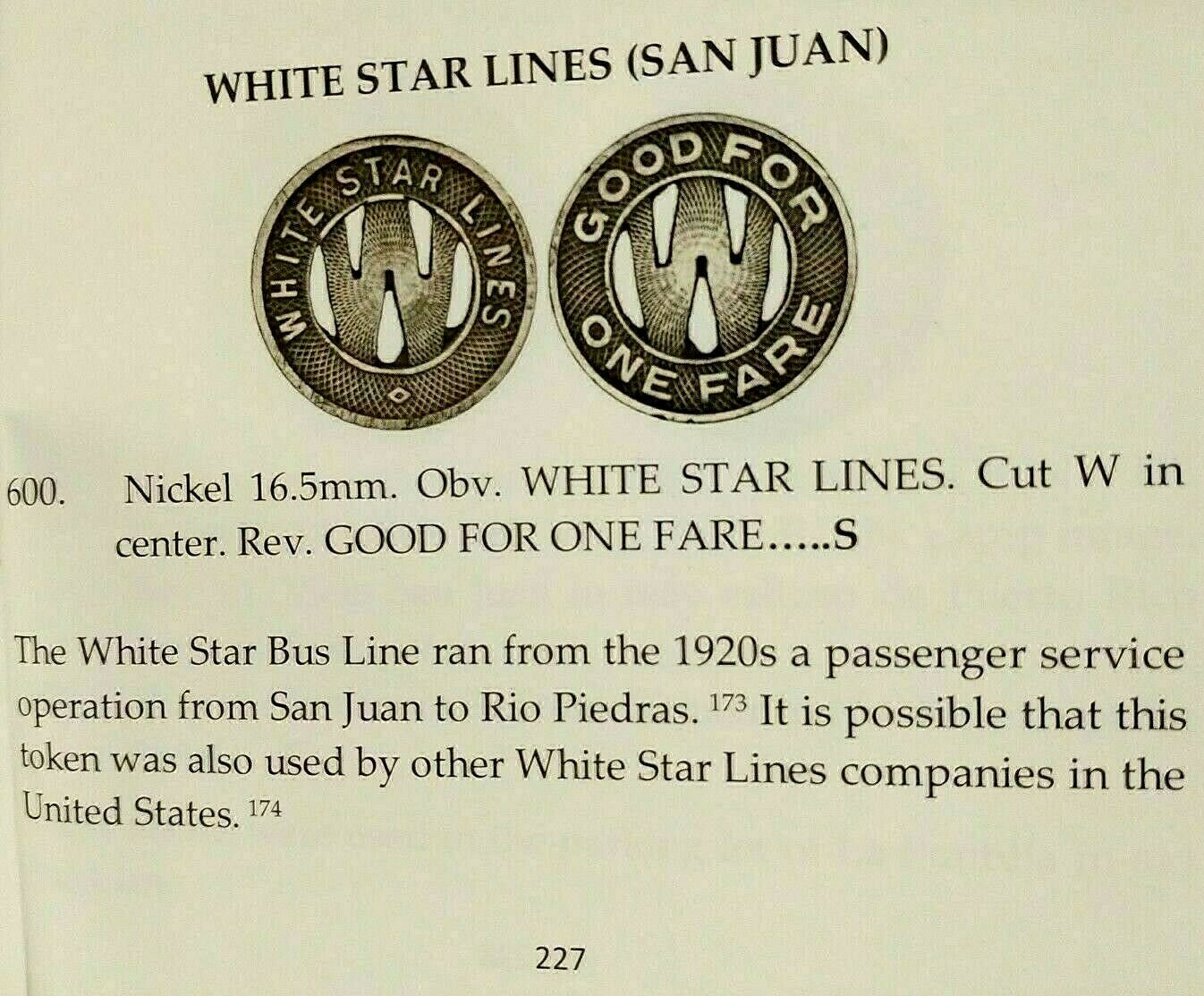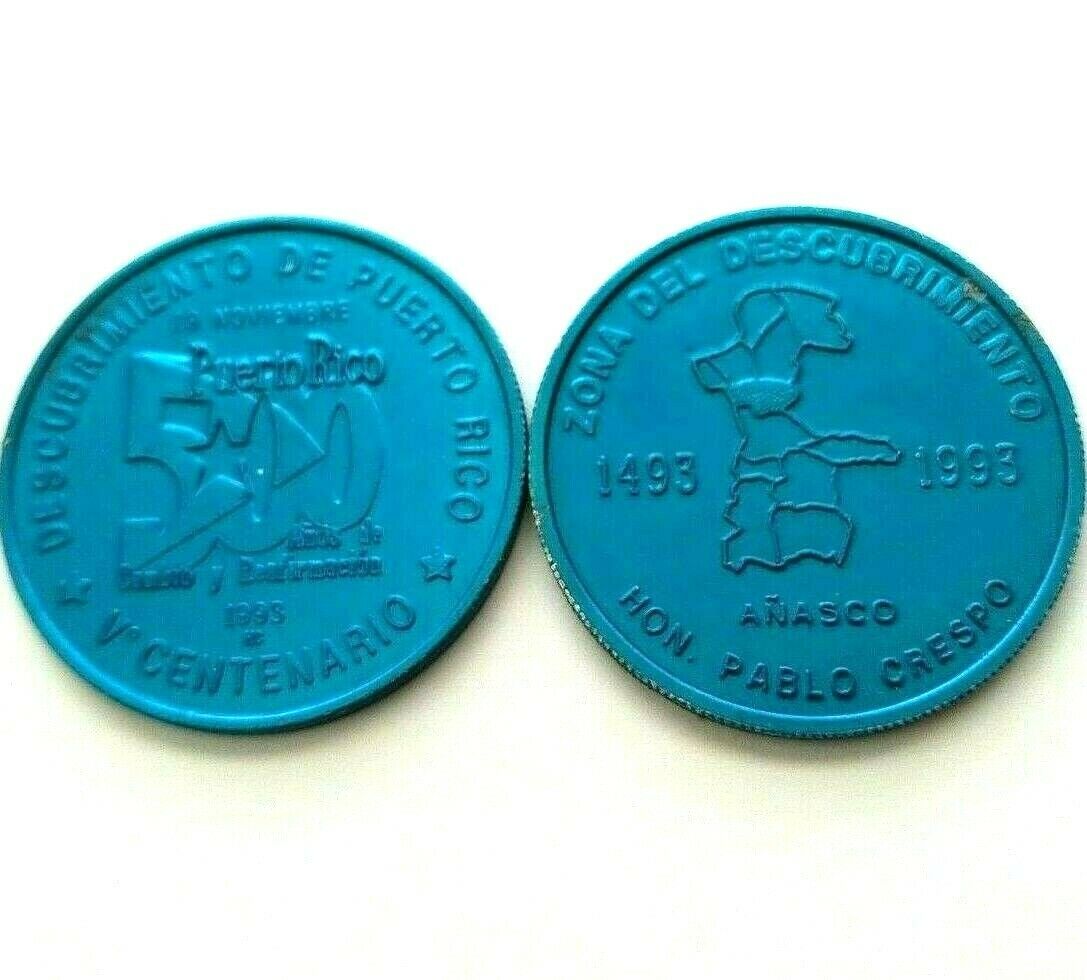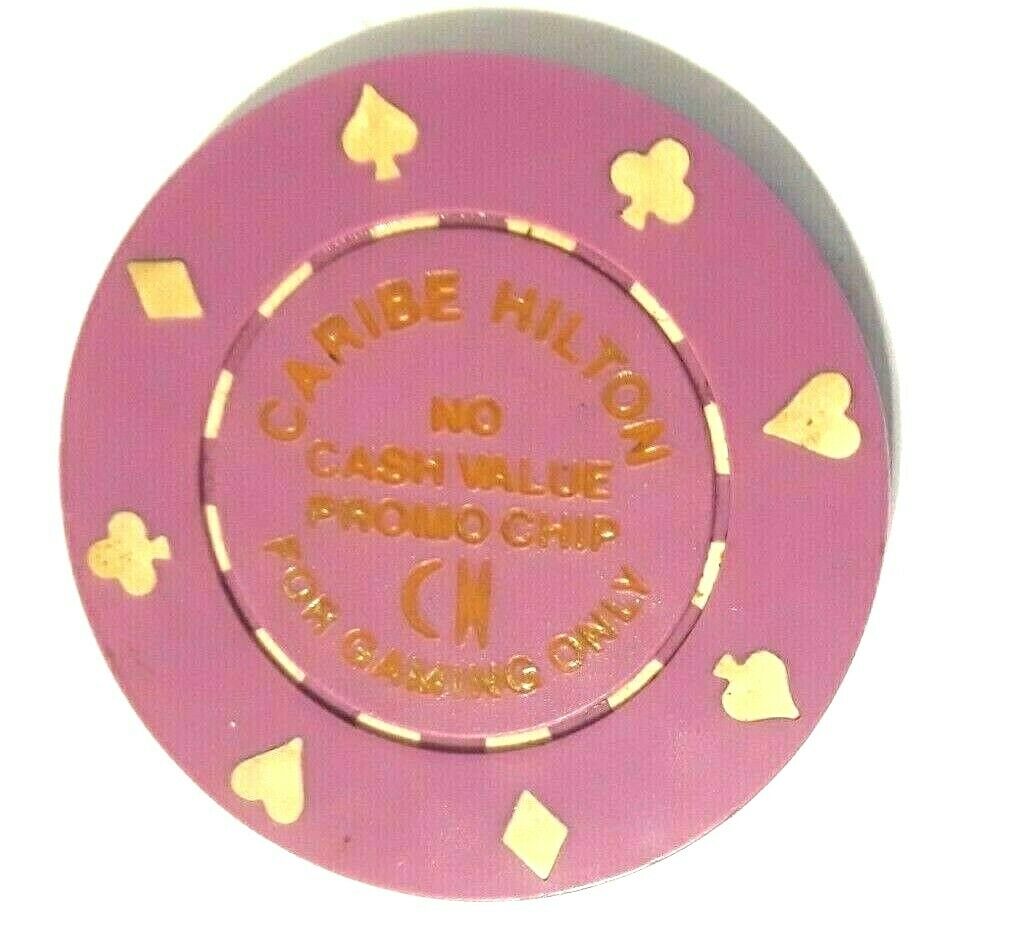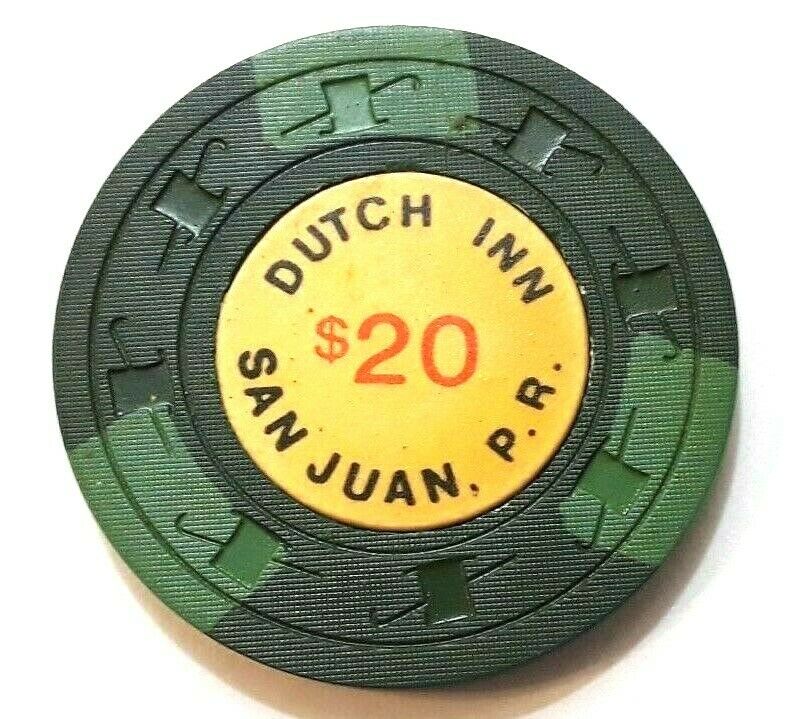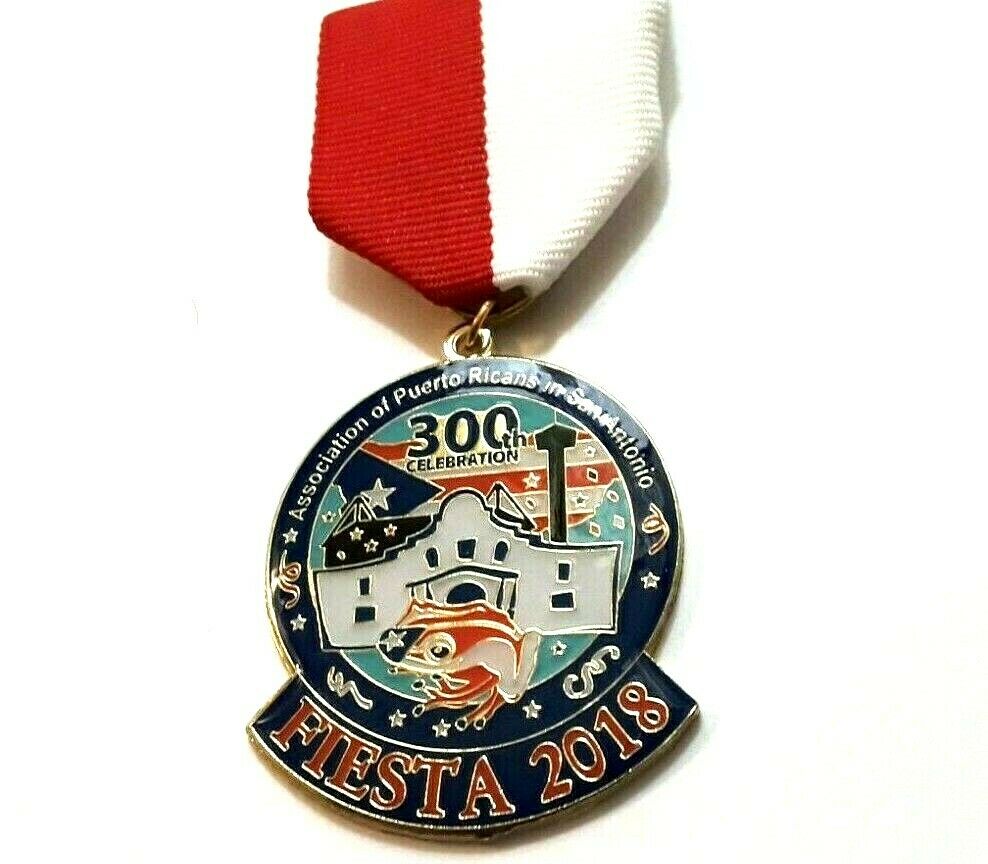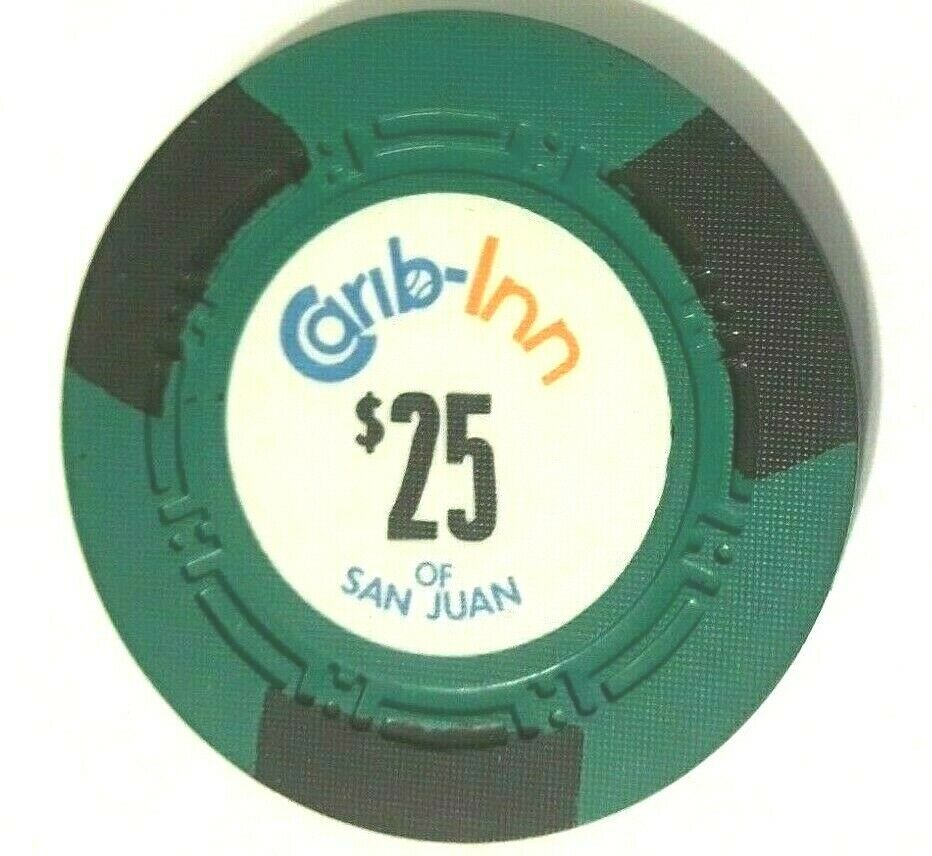-40%
WHITE STAR BUS LINES Ficha Adult PUERTO RICO BUS TROLLEY GUAGUA transit token
$ 36.29
- Description
- Size Guide
Description
SOBRE1,000
SUBASTAS MENSUALES
/ OVER
1,000
MONTHLY AUCTIONS
GANE
POR CADA COMPRADO / EARN
PER EACH BOUGHT
ANA, TNA, NTCA, ECI, CC>CC, NGC, USNS
*******
P
**
R
**
M
*******
TRANSIT TOKEN FROM
PUERTO RICO
WHITE STAR BUS LINES, INC
SAN JUAN
Reverse reads:
"GOOD FOR ONE FARE"
Vea foto para condición
Condition: Used w some
Porosity, Dark, totally
Legible see photos for condition
*****
CAT 1930
*****
*** RARE ***
Listed in 1990 Archilla's
Catalog of Puerto Rico Tokens
Listed in 2012 Fumero's Catalog
of PR Merchant Tokens, as shown
** FOR ENGLISH READ BELOW **
SPANISH:
! SALUDOS !
Esta subasta es por una ( 1 ) Insignia, emblema, medalla, token / ficha, o placa sobre el tema de Puerto Rico, cuya descripción y estado aparace descrita arriba. La pieza es la de la foto, que es garantizada genuina y original, en algunos casos usada
.
Se vende tal cual es, favor de observar las fotos. Si le gustó esta pieza, le exhortamos a que visite nuestras otras piezas disponibles en nuestra tiendita Ebay.
ENGLISH
HOWDY!
This is an auction for one (1) original, genuine, vintage insignia ,emblem, medal, coin, token, or worker tag used at, won, or about in reference to Puerto Rico, among other subjects, conferred to someone from Puerto Rico. The item being sold will be the one shown in the photos, and its condition described above. Some of the items sold are new, some are used and worn, so in any case, please refer to the photos for actual condition of the piece, what you see is what you'll get. If you like these type of items, please visit my store for similar stuff. Thank you!.
ENGLISH:
Evidence of this token used first in Puerto Rico in 1935
(One state claims was used on that state in 1946, go figure...)
Copy of a Court Filling (source: Interntet)
White Star Bus Line v. People of Puerto Rico
Opinion
No. 2973.
February 27, 1935.
Appeal from the Supreme Court of Puerto Rico.
Action by the People of Puerto Rico against the White Star Bus Line, Inc. Judgment for plaintiff, and defendant appeals.
Reversed and remanded, with directions.
Ismael Soldevilla, of San Juan, P.R., for appellant.
William Cattron Rigby, of Washington, D.C. (Benjamin J. Horton, Atty. Gen. of Puerto Rico, and Nathan R. Margold, Solicitor for the Department of the Interior, of Washington, D.C., of counsel), for the People of Puerto Rico.
Before BINGHAM, WILSON, and MORTON, Circuit Judges.
WILSON, Circuit Judge.
This is an appeal from a judgment of the Supreme Court of Puerto Rico in an action by the people of Puerto Rico through its treasurer to recover in behalf of the government a royalty alleged to be due under a franchise contract granted by the Public Service Commission of Puerto Rico to the defendant, the White Star Bus Line, Inc. (which will hereinafter be referred to as the bus line) to operate a motorbus passenger service between the municipalities of San Juan and Rio Piedras in Puerto Rico.
The issue arises over the interpretation of the proviso in section 2 of the franchise contract, or ordinance, as it was termed, which section reads as follows:
"Section 2. During the life of this franchise, the grantee hereby agrees to pay annually to the Treasurer of Porto Rico, on the 15th day of January of each year, a royalty for this franchise as follows: During the first, second, third and fourth years of the franchise, the amount of the royalty shall be four (4) per cent of the annual gross operating revenues of the grantee; during the fifth, sixth, seventh and eighth years, the amount shall be five (5) per cent of said annual gross operating revenues; and during the ninth, tenth, eleventh and twelfth years, the amount of said royalty shall be six (6) per cent of said annual gross operating revenues; Provided, however, That the Public Service Commission shall amend and adjust the percentage of said royalty if after a term of not less than one year of operation of the business of the grantee, and after application by the grantee or by the Commission on its own motion, and hearing by the Public Service Commission, it should be found justified to so amend and adjust the percentage of said royalty so as to allow the grantee herein a fair and reasonable return on the investment."
The government claims that at the end of the first year a royalty of approximately ,000 became due absolutely from the bus line and brought this action to recover. The bus line contends, since under the proviso it was entitled to a fair and reasonable return on its investment, that under the proviso, in case of a failure to receive a fair and reasonable return in any one year, it was entitled to an adjustment of the royalty to be paid for that year.
At the end of the first year, and before the day fixed for the payment of the royalty, it filed on January 14, 1929, a petition with the commission, setting forth that during the year just ending it had received no return on its investment, and asked, in consideration of the result of its first year's operation, that the percentage of royalty be adjusted for that year.
Upon receiving information that the treasurer of Puerto Rico proposed to collect the full amount of the royalty fixed in the franchise contract, the bus line filed a complaint in the district court of San Juan, seeking to restrain the treasurer of Puerto Rico from collecting a royalty for the year ending January 14, 1929. An injunction was denied, and the district court gave judgment for the treasurer in the action to recover a royalty based on 4 per cent. of the gross income of the first year's business of the bus line amounting to ,000.
The bus line appealed to the Supreme Court, which affirmed the judgment of the district court, whereupon the bus line appealed from the judgment of the Supreme Court to this court.
This franchise, while described as an ordinance, partakes both of the nature of a grant of privileges and of a contract between the bus line and the people of Puerto Rico, 26 C.J. p. 1022, § 32, and, in so far as it partakes of the nature of a contract, is subject to the usual rules governing the construction of such contracts. In construing a contract, it is the intent of the parties that governs. If ambiguous, the purpose of the parties in entering into the contract and the history of the negotiations leading up to it may be useful in determining the intent of the parties; also any expression of the parties or their agents at the time the contract was made as to their mutual understanding of the language of the agreement they are about to enter into, as well as any acts of interpretation by the parties themselves. Williston on Contracts, vol. 2, §§ 623, 629; Fitzgerald v. First National Bank of Rapid City (C.C.A.) 114 F. 474; Nelson v. Ohio Cultivator Co. (C.C.A.) 188 F. 620, 623, 624.
The bus line in 1927 applied to the Public Service Commission for the right to operate a motorbus passenger service between the municipalities of San Juan and Rio Piedras in Puerto Rico. The Public Service Commission adopted an ordinance in the nature of a franchise contract for a period of twelve years, in consideration of which the bus line should provide certain services to the public and pay as royalties during the first four years 4 per cent. of the annual gross operating revenues, and during the fifth, sixth, seventh, and eighth years 5 per cent. of its annual gross operating revenues; and, during the remaining four years, 6 per cent. of its annual gross operating revenues.
The bus line refused to accept the franchise proposed by the commission, but suggested that, if the term be extended to twenty years, with certain amendments, it would agree to accept the franchise, provided the royalties were imposed on the basis of its net income; but at the same time it protested the imposing of the royalties as being both unreasonable and ultra vires as to the commission under section 3 and section 38 of the Organic Act (Act March 2, 1917, 39 Stat. 953, as amended 954 [ 48 USCA §§ 741, 750, 753]).
At a hearing before the commission, certain amendments were suggested by the commission, but the franchise with the proposed amendments was not acceptable to the bus line, and the commission refused to modify the franchise ordinance in a manner satisfactory to the bus line.
Later the bus line proposed through its attorneys that it would accept a franchise subject to the royalties imposed in section 2 above quoted, provided a clause was added thereto assuring it an equitable and reasonable profit on the amount invested, if it were shown in due course to the commission that the royalty fixed did not allow a reasonable and equitable profit, and requested that the case be reopened by the commission.
The commission thereupon reopened the case, and, to comply with the bus line's suggestion, proposed that the proviso found in section 2, supra, be added. The franchise with the proviso added to section 2 was accepted by the bus line, which proceeded to operate under it. It still raises the issue, however, of whether the commission has the authority to impose the payment of annual royalties as a condition of receiving a franchise. Having consented to the imposition of the royalties, if the proviso were added, and operated its bus line since January 1, 1928, under the franchise, it is doubtful whether the bus line is now in a position to raise this issue. United Fuel Gas Co. et al. v. R.R. Commission of Kentucky, 278 U.S. 300, 307, 308, 49 S. Ct. 150, 73 L. Ed. 390; Wall et al. v. Parrot Silver Copper Co. et al., 244 U.S. 407, 411, 37 S. Ct. 609, 61 L. Ed. 1229.
At the end of the first year it found that it had made no profit, and immediately petitioned the Public Service Commission to reduce the percentage of the royalty for the year ending December 31, 1928, and also has presented a similar petition at the close of the year 1929, and, we understand, at the close of each succeeding year. Its petition for an adjustment of the royalty for the year 1929 was favorably acted upon by the commission, and the percentage of the royalty for that year was reduced to 1/100 of 1 per cent. of the gross income of the bus line; but the petition for the year 1928 has not yet been acted upon by the commission, presumably because of this action being brought by the treasurer in behalf of the people of Puerto Rico. The action of the commission on these petitions also tends to show that its understanding of the effect of the proviso is the same as that of the bus line.
The government contends that the proviso only contemplates adjustment as to the future and after the first year. The bus line contends that, while it provided that the bus line would not ask for an adjustment of the royalty until it had operated for one year, it was mutually understood that the bus line had a right to ask that the royalty for each year be adjusted on a reasonable basis in consideration of the result of its operation during the year.
A witness for the bus line testified at the time when the proviso was under consideration at the final hearing before the commission that "it was agreed that by virtue of the proviso the Bus Line would not be bound to pay the royalty any year in which it failed to have a reasonable return."
"Inquired by the Honorable Judge whether the franchise was accepted just as it was definitely approved, a witness (for the Bus Line) answered in the affirmative and added: `From the conversation had at the time we (Mr. Cuyar, Mr. Soldevila and myself) appeared; it was understood both by the commission and by the representatives of the corporation that the year in which there was no reasonable return the royalty had to be reduced." (Italics supplied.) This evidence the district court allowed.
The witness so testifying then stated that: "Mr. Esteves (one of the Commission) drew in his own handwriting this proviso and when we, the representatives of the corporation (its treasurer and attorneys), asked what its extent was, we were told by Mr. Esteves, in the presence of the other members of the commission, with their consent and without amendment or objection to his statements by any of them: `according to this proviso, the year that the company has no reasonable return the percentage of the royalty is reduced or adjusted, so that you may always have a reasonable return on the invested capital.'" (Italics supplied.)
Counsel for the treasurer of Puerto Rico objected to the testimony as to the statements of Mr. Esteves, and moved that it be stricken out. The district court allowed the motion. The statement, however, was made in open hearing, in the presence of the other commissioners, and by the person who drew up the proviso. It was a statement by a representative of one of the parties at the time the contract was entered into and as an inducement for the defendant to accept it. We think it should have been allowed to stand. This is not an instance of an individual opinion of a member of a legislative body as to the proper construction of a statute, but an expression by one of the parties as to the meaning of a doubtful phrase in a proposed contract as an inducement for its acceptance by the other party when the meaning of the proviso was under consideration.
In view of the ambiguous language of the proviso and the purpose for which the proviso was added, the testimony of counsel for the bus line that it was drawn by a member of the commission, and therefore should be construed adversely to the party drafting it in case of doubtful meaning, Williston on Contracts, vol. 2, § 621, the testimony as to the mutual understanding of the parties as to the meaning of the proviso at the time it was under consideration, and the acts of the commission in interpreting it by receiving a petition at the end of each year for an adjustment of the royalties for the preceding year, and, in 1930, the granting of an adjustment of the royalty for the year 1929, we think the Supreme Court erred in its interpretation of the contract and in striking out the evidence as to the statement by the member of the commission. Marx v. American Malting Co. (C.C.A.) 169 F. 582, 584; Bijur Motor Lighting Co. v. Eclipse Mach. Co. et al. (D.C.) 237 F. 89; Bunday et al. v. Huntington (C.C.A.) 224 F. 847. No member of the commission was called to deny the above testimony which was received by the court or to testify to any of the proceedings at the time the franchise was granted.
The language of the proviso is ambiguous, but it does not of itself concern a grant of sovereign power to the bus line, which in case of doubt is to be construed in favor of the public, but merely reserves a royalty in the nature of an excise tax, and should, in case of doubt, be construed in favor of the taxpayer.
An adjustment of a royalty for the right to operate motorbusses on the public streets is not like a proceeding to fix reasonable rates for the service, which apply to the future. United Railways Electric Co. of Baltimore v. West et al., 280 U.S. 234, 50 S. Ct. 123, 74 L. Ed. 390; Board of Public Utility Commissioners v. New York Telephone Co., 271 U.S. 23, 31, 32, 46 S. Ct. 363, 70 L. Ed. 808. A proceeding to adjust a royalty under this proviso is more in the nature of an abatement or adjustment of a tax upon good cause shown, and may relate to the past as well as the future. The commission so construed the proviso in 1930 in relation to the royalty for the year 1929. The bus line does not claim that the commission has power to release or adjust a royalty except as the right is reserved in the proviso. If the government's construction of the contract is correct, the royalty was due absolutely; but, if the bus line's interpretation is correct, then the proviso reserved the power to adjust the royalties for any year in which the bus line did not receive a fair and reasonable return.
The bus line's obvious purpose in asking that such a clause be inserted in the franchise was to insure at all times a reasonable return on its investment. It evidently anticipated that, at least, the first years of its operation would be most likely to result in a failure to receive a fair return, and that 4 per cent. on its gross revenues would impose a severe burden, which it is clear was its reason for refusing to accept the franchise at first proposed by the commission and for suggesting an amendment that would insure it a fair return on its investment. To insure such a result, the bus line first proposed an amendment providing for a fixed percentage upon its net income, but this was refused by the commission, and the proviso added to section 2 was finally agreed to. Both amendments were proposed to serve the same purpose.
Even if it be conceded, as the Supreme Court does in denying a reconsideration of its opinion, that it was in the discretion of the Public Service Commission as to whether it would reduce the percentage of the royalties during the first year, we think the bus line under the proviso had a right to have that discretion exercised during any year in which it did not receive a fair return on its investment, and to insist that the commission did not abuse its discretion in this respect. The bus line having petitioned for the determination by the commission of the amount of the royalty for the year ending December 31, 1928, before any action to collect was taken by the government, it was entitled to have the judgment of the commission on its petition before the amount of the royalty fixed in the franchise was collected by the government.
We do not agree that the language of the proviso merely imposes an absolute discretion in the commission as to the amount of royalty it will fix. We think its conclusion must have some relation to what is a fair return on the investment of the bus line.
We are of the opinion that the bus line was within its rights in petitioning the commission to adjust the percentage for the royalty for the year 1928, and that the treasurer could not successfully maintain an action for the tax for that year until the commission had acted on the petition of the bus line, since the royalty for any year was not absolutely fixed by the franchise contract, but was contingent upon the findings of the commission as to whether it was unreasonable if a petition to adjust the royalty was brought at the close of any year, as was done in this instance.
The bus line would have no relief if the government collected the royalty before the commission had acted on its petition, as it cannot sue the people of Puerto Rico to recover without its consent.
The judgment of the Supreme Court of Puerto Rico is reversed, and the case is remanded to that court for further proceedings not inconsistent with this opinion.
MORTON, Circuit Judge, concurs in the result.
ENVIO / SHIPPING :
EMPAQUE /
PACKAGING
Enviamos dentro de mica, cartón, cápsula, o protector acrílico, envuelto entre cartón grueso o burbuja, dentro de sobre o caja sellado con cinta adhesiva a los 4 lados. Haremos todo lo posible por resolver su problema y ganar su satisfacción. Algunas medalla o moneda quizá sea enviada en cápsula de acrílico como cortesía nuestra. Debido a que usted pagó por la medalla o moneda, y no por la cápsula, nosotros no somos responsables de reemplazar cápsulas recibidas rotas. Debido a que las medallas vienen con alguna que otra imperfección de fábrica, es normal que una medalla contenga algún rayacito o cantacito mínimo de lo cual no somos responsables. Las antiguedades que vendemos tienen imperfecciones por vejez, uso y desgaste, que pudieran no reflejarse en las fotos. Por eso sólo reemplazaremos o devolveremos dinero en caso de mercancía recibida gravemente dañada. Clientes que abusen con reclamaciones exageradas e infundadas serán bloqueados en el futuro.
Items are put inside plastic wrap, coin flip or capsule, foam insert, card protector, bank note jacket, FDC jacket, or similar protective method, then shipped padded within card board or bubble wrap inside an envelope or box. We’ll do everything we can to help you and get your 5 stars. Some medals or coins may be shipped inside plastic capsules as a courtesy of ours. Because you paid for a medal or coin, and not for an acrylic capsule, we are not to be held responsible over capsules received cracked or broken. Medals received from the factory will feature minor scratches or nicks over which we shouldn't be held responsible. Likewise, vintage items we sell may feature imperfections due to age, tear, and wear, which may not reflect on the photos. Due to this, we will only replace or provide refund on items received greatly damaged. Clients maliciously seeking to take advantage of the system by placing bogus or exaggerated claims will be blocked from making future business with us.
GASTOS DE ENVIO
/ SHIPPING CHARGES
SUBASTAS pagan envío: 1er ítem gano pagará .99 o más; cada ítem adicional pagará .99 de envío.
(a menos que se indique lo contrario)
AUCTION ITEMS will pay: 1
st
Auction item won pays either .99 or MORE. Each additional item will pay .99 each.
(unless otherwise noted)
EXTRANJEROS /
INTERNATIONAL BUYERS
Para más seguridad y proteger su inversión, utilizamos el Sistema de Envío Global Ebay. Si desea método alterno debe informarme antes de comprar. El comprador pagará los gastos de envío, incluyendo seguro y c
ódigo de seguimeinto. NO ENVIAMOS SIN SEGURO PAGO.
To insure your investment, we use Ebay’s Global Shipment system. If you want another method we must be asked prior to any purchase. Buyers will pay all shipping charges, to include insurance and tracking.
WE WON’T SHIP ITEMS UNINSURED!
PAGO TARDE /
LATE PAYMENT POLICY
Para facilitar y aligerar el proceso de envíos, hemos automatizado nuestro sistema de cobro: EBay procesará todo comprador malicioso que no haya saldado su compra en 7 días.
Due to the large amount of items being sold, and to streamline expedient shipping process, effective APRIL 3, 2014 Ebay's automated non-payer assistant will start processing orders not paid within 7 days of purchase.NO EXCEPTIONS!
TIEMPO DE ENVIO /
WAITING TIME
Todos los artículos serán procesados y enviados dentro de 10 dias laborables a partir de la fecha de pago. Visitamos el correo sólo 1 vez por semana, y NO somos responsables por artículos que tarden más de lo debido por culpa del sistema postal. CON SU COMPRA, USTED APRUEBA LO ARRIBA ESCRITO Y SE COMPROMETE A NO QUEJARSE POR RETRASOS EN EL RECIBO DE SUS ARTICULOS, SOBRE LO CUAL NO TENEMOS CONTROL.
All items will be processed and shipped within 10 working days from date paid. We ship items only Once a week, and we are definitely not liable for items that might take longer to arrive than expected due to our postal system’s mismanagement. BY PURCHASING FROM US YOU UNDERSTAND OUR POLICIES, AND YOU AGREE NOT TO FILE ANY MALICIOUS COMPLAINT IN REGARDS OF ANY DELAY INCURRED, OVER WHICH WE HAVE NO CONTROL.
CANCELACION /
PURCHASE RETRACTION
No cancelamos compras, favor seguir reglas de Ebay.
Se puede retraer una puja de artículo en subasta a más de 12 horas antes de terminar la subasta. Se puede retraer una puja de artículo en subasta a menos de 12 horas antes de terminar la subasta, únicamente si se retrae la puja en menos de 1 hora de cometido el error y a más de 1 hora de que cierre la subasta.
Toda compra a de artículo a precio fijo necesita del cliente una aprobación de la compra. Una vez el cliente confirma la compra del artículo a precio fijo, el cliente queda comprometido a pagarla.
No Purchase Cancellation Allowed
:
Please remember that every bid is binding. Bidding on multiple identical items should be done only if you intend to buy all of the items. A bid on eBay is considered a contract, and you're obligated to purchase the item.
You can retract from bidding if the listing ends in more than 12 hours, or if the listing ends in less than 12 hours, but only if you retract the bid within one hour of placing it. No retraction is allowed within the last 59 minutes of an auction closing.
You cannot retract a purchase made through a Buy It Now listing. Once you confirm your purchase, you are obligated to pay the seller.
